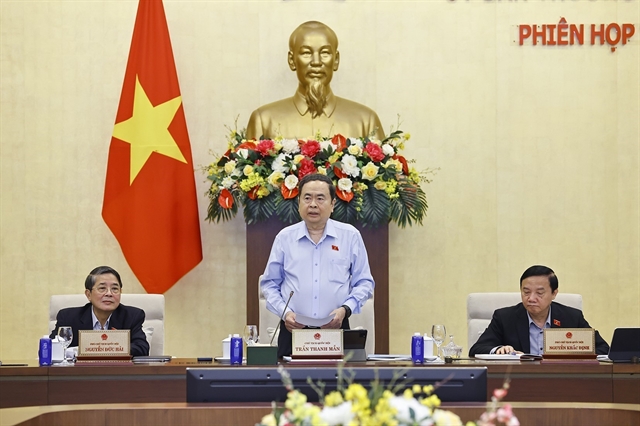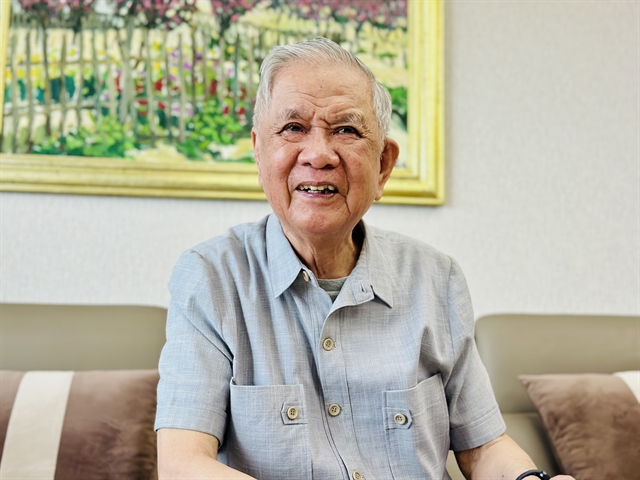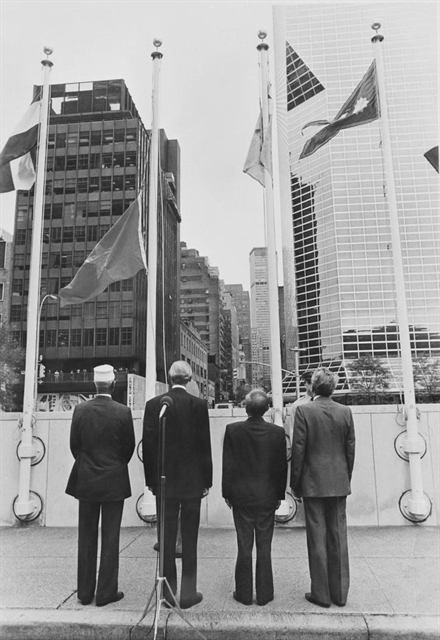 Politics & Law
Politics & Law

 |
| Nguyễn Dy Niên, former member of the Việt Nam Communist Party Central Committee and former Minister of Foreign Affairs. VNA/VNS Photo Việt Đức |
Eight decades after President Hồ Chí Minh declared independence at Ba Đình Square on September 2, 1945, Việt Nam is confidently stepping into a new era of deep international integration.
On this landmark occasion, the Vietnam News Agency spoke with Nguyễn Dy Niên, former Việt Nam Communist Party Central Committee member and former minister of Foreign Affairs, who played a direct role in many of the country’s major diplomatic events.
He reflected on the tremendous achievements of the past 80 years, with particular focus on the 40 years of Đổi mới (Renewal), during which Việt Nam’s diplomatic service made significant contributions.
Overcoming bottlenecks
“I have lived through various phases of the revolution – from the resistance war against French colonialism, to the resistance war against the US for national reunification and now the period of Đổi mới. Witnessing the nation’s steady development fills me with joy, especially today," said Việt Nam's former top diplomat, now 90 years old, who rendered more than half of his life for the diplomatic sector.
"Diplomacy-wise, I feel happy and reassured because Việt Nam’s position on the international stage is now so strong, so remarkable. Back in our time, due to circumstances, this was merely a dream.”
According to Niên, the nation’s eight-decade journey – and especially the renewal efforts – has been a journey of changes in the Party’s mindset in leadership and governance, timely removing obstacles to national development.
The 6th National Congress of the Party in 1986 marked a historic milestone in setting the path of Đổi mới, including for the diplomatic service.
“The Party’s Đổi mới policy enabled the diplomatic service to 'untie many knots' we had long been unable to address, such as relations with Western countries and other regions. This in turn helped advance other fields – from politics and economy to national security, defence, and culture,” he said.
 |
| DIPLOMATIC MILESTONE: The flag-raising ceremony at the United Nations Headquarters on September 20, 1977, marking the nation’s official entry into the world’s largest international organisation. Diplomacy has been key in building peace and integrating Việt Nam into the world. VNA/VNS File Photo |
Highlighting major achievements of Việt Nam’s diplomacy during the Đổi mới era, Niên said that it had played a vital and positive role in the nation’s development.
“Diplomacy helped break through the blockade and embargo. Việt Nam’s diplomats worked with friends and progressive forces worldwide to settle relations with neighbouring countries. We normalised relations with China (1991) and with the United States (1995), joined ASEAN (1995), ASEM (1996), APEC (1998), and on the economic diplomacy front, we signed numerous bilateral and multilateral trade agreements,” he recalled.
Cultural diplomacy
Serving as Foreign Minister for seven years (February 2000 – June 2006), one of Niên’s most recognised contributions was in cultural diplomacy, particularly in activities honouring President Hồ Chí Minh abroad and promoting Hồ Chí Minh’s diplomatic thought.
Before becoming Foreign Minister, he spent 13 years as Chairman of Việt Nam’s National Commission for UNESCO, during which he witnessed a historic moment in 1987 when UNESCO adopted a resolution recognising Hồ Chí Minh as a “Hero of National Liberation and Great Man of Culture of Việt Nam”.
“I attended the 24th General Conference of UNESCO in Paris in 1987, together with Phan Thị Phúc, secretary-general of Việt Nam’s UNESCO National Commission; poet Huy Cận, deputy minister of culture; and a number of ambassadors. We lobbied for the adoption of the resolution to honour President Hồ Chí Minh," Niên said.
"It bears remembering that at the time, Việt Nam had diplomatic relations with just over 50 countries.
"Many others had no relationship with Việt Nam and strongly opposed us. Yet UNESCO’s General Conference voted almost unanimously to honour President Hồ Chí Minh. This showed that it was not merely our lobbying efforts but, above all, President Hồ’s immense prestige on the international stage,” Niên said.
He considered this global recognition proof of Việt Nam’s soft power, reputation, and the moral authority of both its leader and its heroic people.
With a passion for cultural diplomacy and deep admiration for Hồ Chí Minh’s diplomatic thought, Niên—while serving as Foreign Minister—played a key role in compiling and systematising Hồ Chí Minh’s views on diplomacy into a comprehensive body of 'Hồ Chí Minh’s Diplomatic Thought'. He also applied this effectively in foreign policy, thereby enhancing Việt Nam’s international standing and further elevating its cultural diplomacy.
National development confidence
Expressing support for the Party and State’s major policy directions for development in the new era, former foreign minister Niên highlighted the ongoing administrative streamlining and two-tier local government reforms initiated by the Party under General Secretary Tô Lâm. He described it as highly significant for Việt Nam’s transformation from a developing country into a developed nation by 2045.
"To succeed, the key remains a shift in mindset – just like what the Party did nearly half a century ago," he stressed.
“This is still the most important issue. We must look at the world, and we must look at ourselves,” he said.
He also agreed with the leadership’s oft-repeated maxim: “If you want to go fast, go alone; if you want to go far, go together.”
In the context of deeper global integration, Việt Nam, he argued, must walk alongside humanity, other nations the world over. At the same time, he emphasised the importance of preserving national identity: “No matter how deeply we integrate, we must retain our own identity.”
Looking ahead, Niên stressed the need to nurture Việt Nam’s intellectual capacity and gather talent.
“The intellect of the Vietnamese people must be raised even higher. We must cultivate an elite class, assemble them, cherish them, and give them opportunities to serve and contribute to the country,” he said.
Niên praised the Party’s recent resolutions and conclusions, particularly the set of four described as a 'pillar quartet' with significant impact on Việt Nam’s socio-economic development – Resolution 68 (issued in 2025) on the development of private economy; Resolution 57 (2024) on promoting breakthroughs in science, technology, innovation and digital transformation; Resolution 59 (2025) on international integration in a new global context; and Resolution 66 (2025) on renewing the works of law-making and law enforcement to meet the demands of national development in the new era.
From the early challenges of Đổi mới to the nation’s current stature, and with hopes and challenges for the future, Niên expressed a profound faith in Việt Nam’s chosen path and in the aspiration for the country to “stand shoulder to shoulder with the powers of the five continents”, as President Hồ Chí Minh once envisioned. VNS




